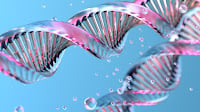A mindfulness-based therapy in which individuals learn to repeat personalized mantras to relax...
PTSD is More Heritable in Females Than Males, Study Finds

Females appear to be genetically more prone to posttraumatic stress disorder (PTSD) than males, according to a report published today in AJP in Advance. This analysis of twins and siblings confirms that PTSD is moderately heritable, with environmental effects unique to the individual who experiences trauma also contributing to the disorder.
“There are well-established sex differences in the prevalence of PTSD, whereby females are approximately twice as likely as males to develop PTSD, a disparity that is robust against trauma type, diagnostic criteria, and methodology,” wrote Ananda Amstadter, Ph.D., of Virginia Commonwealth University and colleagues. This disparity underscores the need to examine genetic differences in PTSD risk across the sexes, they continued.
The researchers made use of data from Swedish national registries to investigate the genetic and environmental factors influencing PTSD among 16,242 twin pairs and 376,093 sibling pairs who were within two years of age of each other; all subjects were born between 1955 and 1980. A total of 148,823 unique individuals were diagnosed with PTSD; the lifetime prevalence of the disorder was higher among females than males (27.8% vs. 11.8%).
The study revealed a modest influence of genetics on the development of PTSD, with that influence being greater among females (35.42%) than among males (28.60%). Unique environmental effects—that is, influences that were not necessarily shared by twins or siblings—accounted for the remaining variance.
Amstadter and colleagues found that the genes that influence PTSD in women and men are not entirely the same, suggesting one line of future research should investigate the genetic influences of sex hormones—estrogen and testosterone—which may play a role in the disorder.
They noted, as well, that one recent meta-analysis of trauma-focused PTSD treatments found a higher rate of treatment response for women versus men. “Although the source of these differential psychosocial treatment effects is not yet known, they constitute a growing area of research,” Amstadter and colleagues wrote. “One such future direction includes the exploration of genetic influences on treatment response.”
For related information, see the Psychiatric News article “Genetic Makeup May Affect PTSD Risk.”
(Image: Getty Images/iStock/Vertigo3d)
Don't miss out! To learn about newly posted articles in Psychiatric News, please sign up here.





